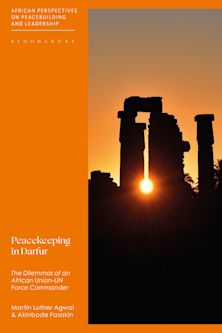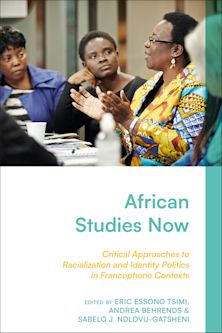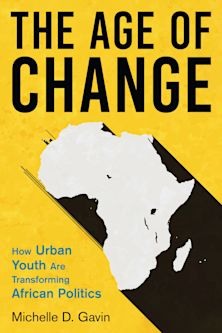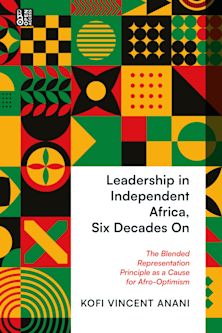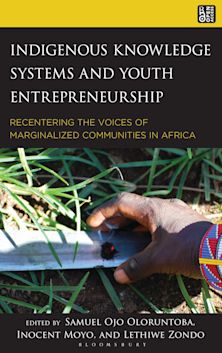- Home
- ACADEMIC
- Politics & International Relations
- African Politics
- Trade Unions and the Age of Information and Communication Technologies in Kenya
Trade Unions and the Age of Information and Communication Technologies in Kenya
Trade Unions and the Age of Information and Communication Technologies in Kenya
You must sign in to add this item to your wishlist. Please sign in or create an account
Description
Trade Unions and the Age of Information and Communication Technologies in Kenya provides a comprehensive description of the use of ICTs within the trade union movement in Kenya. In this book, Professor Eric Otenyo explores the intersection between new technologies and union as key stakeholders in national governance and development. The dearth of research on how trade unions can play a part in the new economy continues to undermine the effective use of ICTs in development. This book brings to light the challenges that unions face while navigating the new economy and netstate characterized by a proliferation of ICTs and globalization.
Table of Contents
Acknowledgments
Chapter 1: Unions and the Age of ICTs in Kenya: An Overview
Chapter 2: Trade Unions, ICTs and Public Policy in the New Economy
Chapter 3: Industrialization and Technology Diffusion: State Capacity in the Age of ICTs
Chapter 4: Unions: Education, Laptops, and Shrinking of the Digital Divide
Chapter 5: Trade Union Member Attitudes Towards ICTs: Implications for Participation in Governance
Chapter 6: Productivity Discourses, Information Technology, and Unions
Chapter 7: Trade Unions and Internationalism: Emerging Governance Networks
About the Author
Product details
| Published | 01 Mar 2017 |
|---|---|
| Format | Ebook (Epub & Mobi) |
| Edition | 1st |
| Extent | 264 |
| ISBN | 9781498548809 |
| Imprint | Lexington Books |
| Illustrations | 5 Tables |
| Series | African Governance, Development, and Leadership |
| Publisher | Bloomsbury Publishing |
About the contributors
Reviews
-
In his 249-page book, Otenyonavigates this path skillfully, thereby demonstrating where unions in Kenyahave leveraged ict to register success and, in critical areas, where they havecome short. It is a book packed with details, insightful analysis and speculationsabout what the future holds. . . In all, Otenyo has authored an intellectually-engaging book, which forces usto consider the evolution of worker-right organizations in a rapidly changingeconomic environments.
African and Asian Studies (AAS)
-
Eric Otenyo examines trade unions in the age of information and communication technologies in Kenya’s development process. Otenyo effectively argues that whereas Kenya’s trade unions are relatively weak organizationally, there is room for ICTs to be leveraged for the greater benefit of workers. This book provides invaluable insights not just for developing labor-rich economies such as Kenya, but, most importantly, for developed countries such as the USA where automation, digitization, and globalization have generated the loss of millions of jobs even as they have spawned greater productivity and profitability.
Wanjala S. Nasong'o, Rhodes College
-
Trade unions and policy makers have not adequately investigated full implications of ICT’s impact on development and governance in Kenya. Prof Otenyo’s work is an analytical approach to understanding the impact of ICTs on productivity, education, and daily experiences of ordinary and trade unionized workers in Kenya. Rich with of-the-moment examples of how ICT s are allied in the new economy, as well as challenges facing trade unions, Prof Otenyo’s book underlines the emerging feature of modern society that has to be interrogated, if African society has to be a meaningful participant in a globalized world.
Musambayi Katumanga, University of Nairobi
-
There are very few references on the nexus between trade unions, ICT, and development in Kenya and beyond. Otenyo’s book therefore fills an important gap in the literature.
Kefa M. Otiso, Bowling Green State University
-
This book is a timely analysis of Kenya’s ICT policy and how trade unions can leverage the opportunities presented by the new technologies to advance their causes and promote the interests of their members. This book has revealed the major achievements recorded by Kenya in enhancing internet connectivity and advances in mobile telephony and the development and adoption of cutting edge applications such as the Mpesa money transfer system. The book further depicts how various factors such as education policy, globalization, corruption, bureaucratic inefficiencies, and international actors, have coalesced to either hinder or advance technological uptake in Kenya.
Michael Kithinji, University of Central Arkansas














